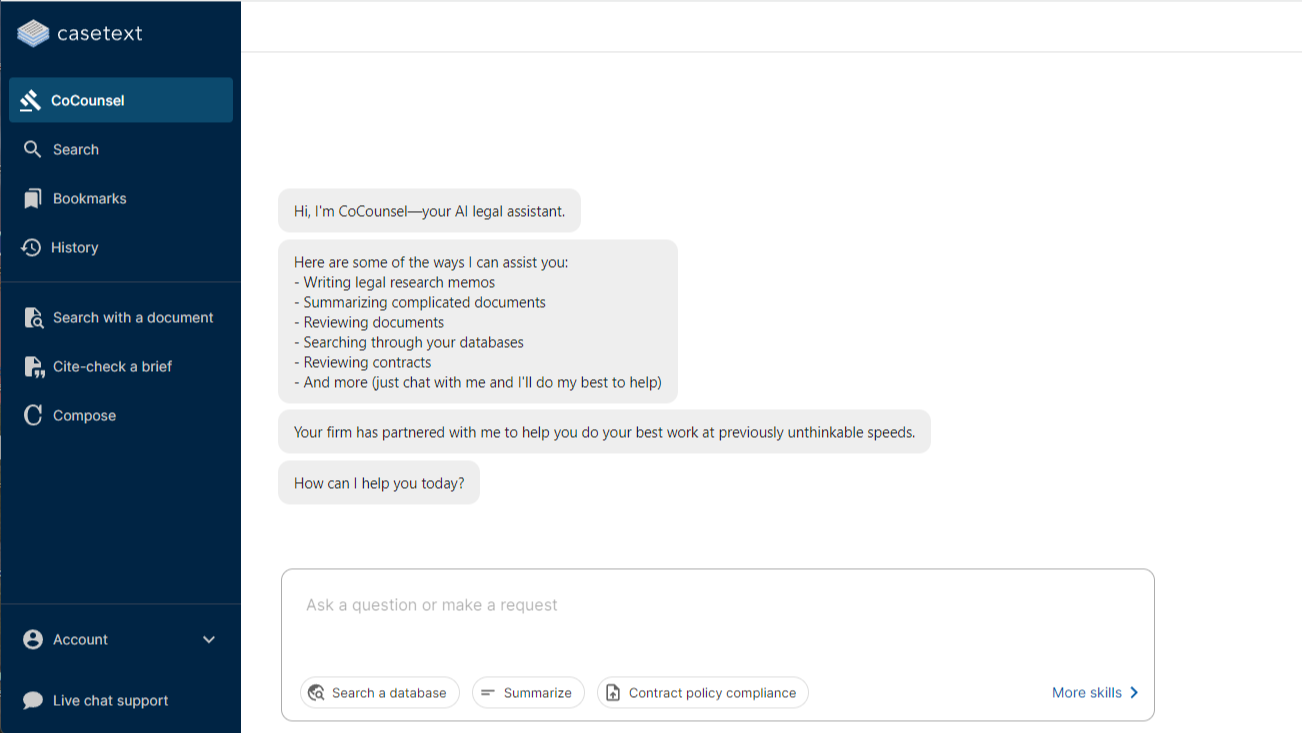
Casetext CoCounsel: Complete Buyer's Guide
The evolution of legal AI from experimental tool to enterprise-grade platform
Casetext CoCounsel represents the evolution of legal AI from experimental tool to enterprise-grade platform, combining OpenAI's GPT-4 foundation with specialized legal training and Thomson Reuters' enterprise infrastructure. Following Thomson Reuters' $650 million acquisition of Casetext, CoCounsel has emerged as a comprehensive legal AI solution that transforms time-intensive research, document analysis, and case preparation workflows across multiple practice areas[38][39].
Market Position & Maturity
Market Standing
CoCounsel occupies a dominant position in the legal AI market through Thomson Reuters' strategic $650 million acquisition, transforming from innovative startup to enterprise platform component with established vendor stability[38][39].
Company Maturity
This acquisition provides financial backing and eliminates startup-related vendor risks that concern legal professionals managing client confidentiality requirements.
Growth Trajectory
Growth trajectory indicators include rapid customer acquisition with 1,000 new customers added in 45 days following self-serve launch, demonstrating market demand extending beyond large firms to smaller practices[39].
Industry Recognition
Industry recognition stems from OpenAI's specific selection of Casetext to "tailor their groundbreaking model to the practice of law," representing validation from the leading AI technology provider[52].
Strategic Partnerships
Strategic partnerships with Thomson Reuters create ecosystem advantages through integration across Westlaw Precision, Practical Law, and Document Intelligence platforms[47].
Longevity Assessment
Longevity assessment benefits from Thomson Reuters' established market position and financial stability, addressing vendor risk concerns that affect legal organizations managing long-term client relationships and confidential information.
Proof of Capabilities
Customer Evidence
Enterprise customer validation demonstrates CoCounsel's effectiveness across demanding legal environments, with systematic deployment at 45+ large law firms including six Am Law 10 firms representing over 50,000 lawyers in production use[47].
Quantified Outcomes
Quantified performance outcomes from Fisher Phillips provide specific evidence of capability delivery. The firm's Chief Knowledge and Innovation Officer documented research tasks requiring five associate hours completed in five minutes, producing 12-page analysis suitable for slip-and-fall defense arguments[44].
Case Study Analysis
Implementation scale evidence emerges through Dykema's extensive validation process, with the firm dedicating 4,000 hours of testing across 30,000+ legal queries before deployment[50].
Market Validation
Market adoption velocity provides additional capability evidence, with 1,000 new customers added in 45 days following self-serve launch[39].
Competitive Wins
Competitive displacement evidence emerges through customer testimonials emphasizing CoCounsel's advantages over generic AI tools. The platform's specialized legal training addresses fundamental limitations of tools like ChatGPT that lack domain expertise for legal contexts[2][6].
Reference Customers
Reference customer diversity spans multiple practice areas with documented success in employment law, litigation research, and contract analysis workflows. Fisher Phillips' extensive deployment across employment law cases provides the strongest evidence of practice area effectiveness[44].
AI Technology
CoCounsel's technical architecture represents a sophisticated fusion of OpenAI's GPT-4 foundation with specialized legal training developed through Casetext's five years of legal AI experience. OpenAI specifically selected Casetext to "tailor their groundbreaking model to the practice of law," resulting in domain-specific capabilities that extend far beyond generic AI applications[52].
Architecture
Integration architecture leverages Thomson Reuters' ecosystem infrastructure, with CoCounsel "now generally integrated into Westlaw Precision" to provide seamless workflow experiences[41].
Primary Competitors
The primary competitive landscape includes both specialized legal AI providers and generic AI tools, with CoCounsel positioned as a comprehensive enterprise platform rather than point solution. The platform competes against specialized legal AI tools like Parrot, DepoIQ, and AI.Law, while also addressing competition from generic AI applications like ChatGPT that lack legal domain expertise[2][6].
Competitive Advantages
Core competitive advantages center on specialized legal training built on Casetext's "vast, up-to-date collection of caselaw and statutes" combined with OpenAI's GPT-4 foundation[52].
Market Positioning
Market positioning evolution reflects CoCounsel's transition from innovative startup to enterprise platform component, providing stability advantages while potentially reducing innovation velocity compared to dedicated AI vendors.
Win/Loss Scenarios
Win scenarios favor organizations with existing Thomson Reuters relationships seeking integrated AI capabilities within familiar workflows. Loss scenarios emerge for cost-sensitive organizations where specialized alternatives provide core legal AI functionality at lower price points.
Key Features

Pros & Cons
Use Cases
Integrations
Pricing
Featured In Articles
Comprehensive analysis of AI Deposition Summarization for Legal/Law Firm AI Tools for Legal/Law Firm AI Tools professionals. Expert evaluation of features, pricing, and implementation.
How We Researched This Guide
About This Guide: This comprehensive analysis is based on extensive competitive intelligence and real-world implementation data from leading AI vendors. StayModern updates this guide quarterly to reflect market developments and vendor performance changes.
54+ verified sources per analysis including official documentation, customer reviews, analyst reports, and industry publications.
- • Vendor documentation & whitepapers
- • Customer testimonials & case studies
- • Third-party analyst assessments
- • Industry benchmarking reports
Standardized assessment framework across 8 key dimensions for objective comparison.
- • Technology capabilities & architecture
- • Market position & customer evidence
- • Implementation experience & support
- • Pricing value & competitive position
Research is refreshed every 90 days to capture market changes and new vendor capabilities.
- • New product releases & features
- • Market positioning changes
- • Customer feedback integration
- • Competitive landscape shifts
Every claim is source-linked with direct citations to original materials for verification.
- • Clickable citation links
- • Original source attribution
- • Date stamps for currency
- • Quality score validation
Analysis follows systematic research protocols with consistent evaluation frameworks.
- • Standardized assessment criteria
- • Multi-source verification process
- • Consistent evaluation methodology
- • Quality assurance protocols
Buyer-focused analysis with transparent methodology and factual accuracy commitment.
- • Objective comparative analysis
- • Transparent research methodology
- • Factual accuracy commitment
- • Continuous quality improvement
Quality Commitment: If you find any inaccuracies in our analysis on this page, please contact us at research@staymodern.ai. We're committed to maintaining the highest standards of research integrity and will investigate and correct any issues promptly.